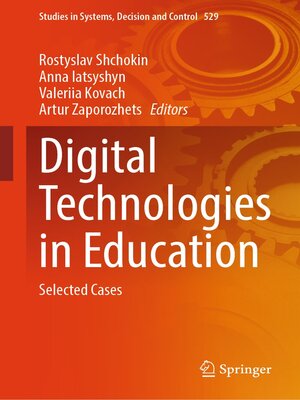Digital Technologies in Education
ebook ∣ Selected Cases · Studies in Systems, Decision and Control
By Rostyslav Shchokin

Sign up to save your library
With an OverDrive account, you can save your favorite libraries for at-a-glance information about availability. Find out more about OverDrive accounts.
Find this title in Libby, the library reading app by OverDrive.



Search for a digital library with this title
Title found at these libraries:
| Library Name | Distance |
|---|---|
| Loading... |
Among the technologies that significantly change the modern world of human existence, it is worth mentioning, first of all, digital technologies. These technologies are actively and relentlessly implemented and integrated into all spheres of human activity and society, becoming a powerful catalyst and a determining source of social development. According to such a scenario of development, society acquires the features of digital, thus defining digital technologies as its leading technology. This process is called the digital transformation of society. The wide use of digital technologies to provide free access to information and knowledge is a basic principle of the digital society. Digital society significantly changes traditional ideas about work, education, culture, communication, social and political life. The development of citizens' digital culture is the main condition for the successful construction of a digital society. Therefore, it is important to carry out scientific research and targeted training to improve the qualifications of specialists in various branches of the economy, in particular, educators and scientists to acquire digital competence. After all, these specialists are key figures in ensuring the process of digitalization of education and science. The book presents various aspects of the digital transformation of education and science. A comprehensive view of the current state and prospects of the use of digital technologies for education and science is provided. The experience of using digital technologies and tools for training and improving the qualifications of specialists of various specialties, as well as for the preparation of future PhDs, is described. The book is addressed to education workers, managers, scientists, graduate students, librarians, and all those who are interested in the process of digital transformation of education and science.







